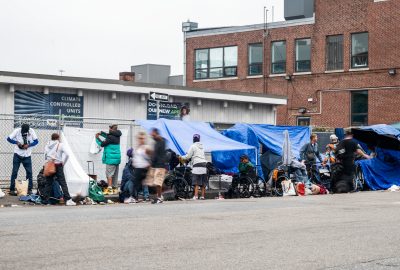The City of Boston announced an initiative to tackle drug use of the unhoused population at the intersection of Massachusetts Avenue and Melnea Cass Boulevard at an Oct. 20 press conference.

These measures include a sweep of the encampment at Mass and Cass, relocating the homeless population of Southampton Street to Atkinson Street and incentivized needle collection and access to free and sanitary drug paraphernalia.
Executive Director of the Boston Public Health Commission Bisola Ojikutu views harm reduction as “vital” to people’s safety.
“The more we can reduce the risks associated with substance use, the more effectively we can help people recover,” Ojikutu wrote in an email statement. “Like any other chronic disease, people struggling with substance use issues deserve a chance to get better.”
On Jan. 12, the City began its sweeps of the Mass and Cass encampments as part of its “public health centered approach to encampment resolution,” according to the Mass and Cass data board.
Since then, the City has consistently taken in more syringes than it has distributed through its City Recovery Services programs, which reported a return rate of 2.50 for this month.
Additionally, The City has 1,960 substance abuse treatment placements and housed 417 people at the six low-threshold sites since Jan. 12, as of Oct. 31. Some of these sites include Boston Medical Center at Roundhouse Hotel and Pine Street Inn at Shattuck Cottages.
An unhoused resident of Mass and Cass, who goes by Lola, was initially skeptical about the City’s harm reduction measures.
“My perception of harm reduction was you can still get high,” Lola, who has experienced homelessness since 2010, said. “Why would you take a bunch of junkies and put them in a hotel or give them their own apartment and think they’re going to just stop using?”
However, once she arrived at one of the homeless-designated hotels in the area, her perspective shifted.
“It was wonderful to be able to take a bath, it was wonderful to put clothes on, it was wonderful to have a pillow,” Lola said. “As we stayed [at hotels], slowly, I didn’t want to get high anymore. I didn’t want to keep coming down here.”
Addiction Response Resources set up a needle buyback program called Community Syringe Redemption Program, where people can exchange used needles littered on the streets in exchange for money. For Lola, this initiative was an effective solution to the prevalence of HIV in the Mass and Cass area.
“We have a huge outbreak of HIV right now,” Lola said. “Without [AHOPE], I can’t even imagine the numbers.”
Margie Skeer, a Weiner Hailey Family professor at Tufts University, specializes in substance use and addiction.
“When it comes to people who use drugs… we as a society have such a stigma against it, but meeting people where they are is much more effective than treating substance use and substance use disorders as a moral failing,” she said.
Skeer thinks that harm reduction facilities treat the homeless community with more decency than most institutions.
“Harm reduction centers… provide people with an opportunity to feel like a human being,” Skeer said. “Oftentimes, when people who have substance use disorders interact with most systems… they’re thought of as almost like a throw-away population.”
As a result, the Access, Harm Reduction, Overdose Prevention, and Education encourages those who are homeless to seek treatment.
“If somebody is interested in getting treatment, they can turn to somebody at AHOPE,” Skeer said. “They might be much more reluctant to go to a doctor or hospital because of the way that they’re treated.”
The condition of Mass and Cass is also seen by those working at the businesses on nearby Newmarket Square, like community champion and outreach coordinator for The Phoenix, Dina Gonsalves.
The Phoenix, located half a mile away from Mass and Cass, is a free gym for recovering addicts, with the only condition being a minimum of 48 hours of sobriety to attend. Also acting as outreach coordinator, Gonsalves visits local treatment providers and attends reentry panels for inmates to introduce them to The Phoenix.
Gonsalves said The Phoenix aspires to have a positive impact on the Mass and Cass homeless community.
“Even though there are people out there and they’re homeless and they’re using, they’re still human beings,” Gonsalves said. “Being a voice and a platform that can help people with (addiction) is something that I do and I love what I do.”
As a recovering addict herself, Gonsalves can also understand the hardships endured by the homeless residents seen daily at work.
“I’m a person in recovery,” Gonsalves said. “I’m very grateful that I never had to live in the street or be homeless. But I still know what active addiction looks like. It robs you of everything.”


















































































































